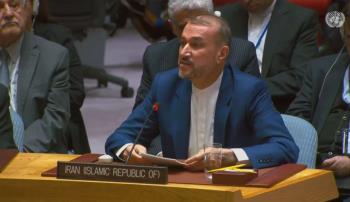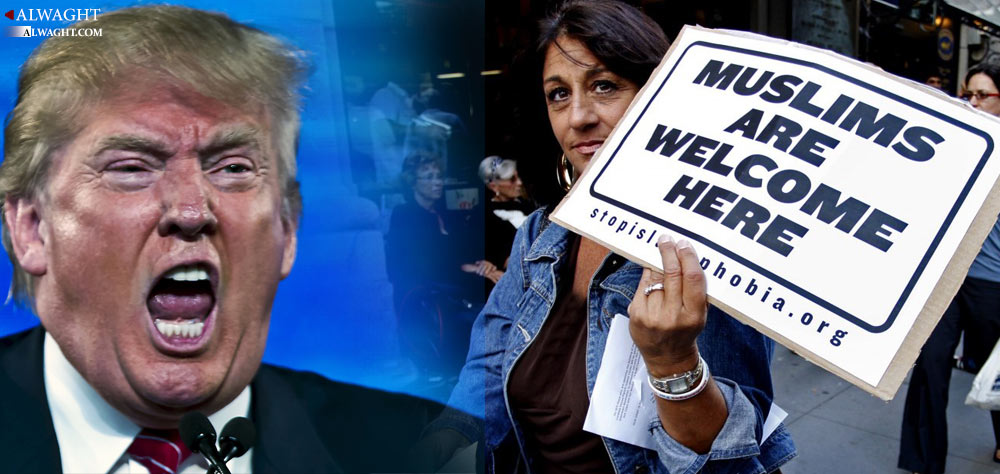Alwaght- US President Donald Trump’s decision to shut the doors of immigration in the face of refugees and visitors from seven Muslim-majority nations speaks volumes about his policy and its inherent bigotry.
On Friday, Trump placed a four-month hold on allowing refugees into the US and temporarily barred travelers from Iran, Iraq, Libya, Somalia, Sudan, Syria and Yemen under the pretext of protecting Americans from terrorist attacks.
Sectarianism and Islamophobia
Trump is clearly promoting sectarianism and Islamophobia. Targeting Muslims in general, Trump’s decision makes room for sympathy only for non-Muslims. The order seeks to prioritize refugees fleeing “religious persecution”, a move Trump separately said was aimed at helping Christians in Syria.
Legal experts have questioned whether the order was constitutional or not but it does not take expertise to notice that this amounts to sectarianism. Travelers from these countries who are seeking refuge, particularly from Syria, equally face persecution from the likes of ISIS even if they are themselves Muslims. Helping one religious group but not the other is tantamount to unjustifiable discrimination.
Furthermore, claims that the decision is religion neutral is farce. Although the executive order does not name Muslims per se, it is highly suggestive that the Muslims of these countries who bear “violent ideologies” toward the US are its target.
“President Trump has cloaked what is a discriminatory ban against nationals of Muslim countries under the banner of national security," said Greg Chen of the American Immigration Lawyers Association.
The fact is that there is no basis for this discriminatory act against Muslims because this is what reality proves.
All American white supremacist extremists have killed more Americans in the US since 9/11 than American or non-American “Islamic extremists.” Yet, even if the numbers revealed otherwise, the ban imposed by Trump’s administration wouldn’t address the problem because no perpetrator of a major attack in the US is from a country on Trump’s list.
Even more contradictory with Trump’s move is a recent study from the Cato Institute’s Alex Nowrasteh which found that an American’s odds of being killed by an immigrant terrorist of any faith are one in 3.6 million while those of being killed by a refugee are one in 3.6 billion.
Iranophobia
The new president's decision also seems to promote Iranophobia, because among these seven countries- Iran seems out of place as it is neither war-torn nor has it been the breeding ground for terrorism.
The point is not counterterrorism but rather to limit the entrance of Muslims into the country. The inclusion of the Islamic Republic of Iran in the list further suggests that the decision is not driven by national security concerns but rather politically.
However, when it comes to Iran, some regard the move as an attempt to tap into Iran’s bank of information. In the coming three months, the Trump administration will assess if the governments on the list are providing enough information about citizens seeking visas. If the governments do not comply, citizens will bear the brunt.
Tehran ideologically opposes sharing information with Washington which it perceives as a hegemonic power. It seems that this ban was a deliberate move by Trump’s administration.
A sense of injustice prevails among Iranians who believe they do not belong on the list in the first place. As no Iranian has been accused of carrying out an attack on US soil— as opposed to citizens of other countries that are not on the list—including Iran in the ban is highly controversial.
However, the Islamic Republic did not take an idle stance. Tehran announced a reciprocal travel ban on Washington just a day after the announcement.
"While respecting the American people and distinguishing between them and the hostile policies of the U.S. government, Iran will implement the principle of reciprocity until the offensive U.S. limitations against Iranian nationals are lifted," a Foreign Ministry statement said.
The current executive order is clearly a politically-motivated move that is based on discriminatory policies, albeit concealed in non-religious semantics. Trump’s administration is attempting to incorporate Islamophobia and religious discrimination as a whole into the country’s immigration policy to build another wall, an invisible wall against those who are different. If it works, then the multiethnic multicultural fabric of the US might disintegrate.



























